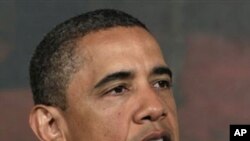President Barack Obama has met with his national security team to discuss Afghanistan and Pakistan. Monday's meeting of the Afghanistan-Pakistan advisers group came amid reports that some officials are urging a larger drawdown of U.S. forces beginning next month.
After Monday's nearly two-hour meeting, Press Secretary Jay Carney told reporters the decision President Obama will make about the size of the July drawdown was not a specific item on the agenda.
The president was briefed on progress in implementing his Afghanistan-Pakistan strategy following the death of Osama bin Laden, and on efforts to ensure "effective cooperation with Pakistan against al-Qaida and other violent extremists."
Mr. Obama has not yet received recommendations from Secretary of Defense Robert Gates and Afghanistan commander General David Petraeus about the size of the July drawdown or what kind of forces will be involved. Carney said once that decision is made, Mr. Obama will report it to the American people, but the form or venue is still not known.
There are about 90,000 American troops in Afghanistan forming the bulk of the International Security Assistance Force (ISAF). This includes the 30,000 soldiers President Obama sent in 2010 as part of a surge aimed at turning back Taliban advances.
Aside from Mr. Obama, 26 officials participated in Monday's session, including Defense Secretary Gates, who reported via video link on his just-completed farewell tour in Afghanistan. Gates favors a more modest drawdown of forces.
The meeting came amid a report that some officials are pushing for a sharper drawdown in July. The New York Times quoted unnamed officials as citing the financial costs to the United States of the war, already the longest in U.S. history, and the killing of al-Qaida leader Osama bin Laden as among the factors justifying a larger troop withdrawal in July.
Jay Carney pushed back a bit on one aspect of that report. While every decision is made with the question of cost in mind, he said, Mr. Obama's decision will focus primarily on U.S. national security interests. Carney asserted that there is not a great deal of debate about the impending decision. "This decision about the size of the initial drawdown is one in keeping with the decision the president made back in December of 2009. There is not enormous debate about this, despite some reporting to the contrary," he said.
President Obama has said the start of the U.S. drawdown would be based on conditions in Afghanistan, where the United States and NATO have set a goal of completing the transfer of all security responsibilities to Afghan government forces by 2014.
This past April, the president spoke about U.S. objectives. "In Afghanistan, we are moving into a new phase, transferring responsibility for security to Afghan forces, starting to reduce American forces this summer, and building a long-term partnership with the Afghan people," he said.
Mr. Obama also faces pressure from lawmakers on the left of his Democratic party, who favor scaling back foreign military operations because of their cost.
California Democrat Lynn Woolsey raised the issue of war costs while debating Republicans over government spending cuts. "You believe in fiscal discipline, and you think everything should be on the table. Then let's talk about saving $10 billion a month by ending the war in Afghanistan, and let's bring our troops home from Iraq, and Afghanistan," she said.
Key Republicans opposed attempts to put Congress on record favoring a troop withdrawal from Afghanistan.
Congresswoman Ileana Ros-Lehtinen, who heads the House of Representatives' Foreign Affairs Committee, spoke earlier this year against a resolution calling for a withdrawal of all U.S. forces. "To withdraw from Afghanistan at this point before we finish the job is to pave the way for the next 9/11," she said.
White House spokesman Carney told reporters Monday that President Obama would make his decision on the July drawdown "relatively soon." He quoted President Obama as saying during a television interview on Monday that this will be "a summer of transition" in Afghanistan.
Carney told reporters that there will be no precipitous withdrawal of U.S. or international forces, saying the July troop decision will be the "beginning of a process."





